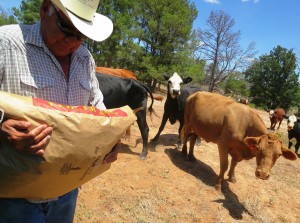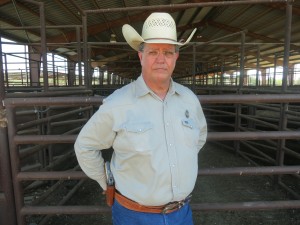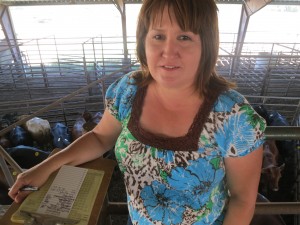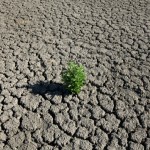More on Texas Cattle Rustling
Audio slideshow by Reporting Intern Ann Choi
Cattle rustling, the age-old crime of stealing livestock, might seem like something for the history books. But, as our readers and listeners learned last month, Texas ranchers are seeing an increase in stolen cows, even as the number of cattle dwindles.
The report generated a lot of interest. It went viral online and was featured on NPR’s All Things Considered.
But, as is often the case, we still have more of the story to tell. This time in pictures.
Click the player above to view an audio slideshow of photos snapped on a recent reporting trip to Giddings, Texas and hear the NPR report. Peruse the text after the jump to learn more about black market bovines, and the people we met while reporting.
Head Count
Paulie Sanchez, a rancher in Giddings, Texas, takes a headcount of cows at his ranch in not by using a horse or lasso – but with a pickup truck and a feed bag.
“I’m gonna put the sack of feed between my legs here. Draw ‘em out and they’ll come,” Sanchez said.
In a flash, he’s grabbed the feed bag from the bed of the truck, and is back behind the wheel — throwing food out the window.
“That’s all it takes,” Sanchez said.
The animals that seemed so sleepy just seconds before, now spring to life. They charge the truck, and one even head butts it. But once the food’s on the ground they settle down. Sanchez circles the herd taking mental note.
“They’re all here. That’s 33 of ‘em. 33 Cows and 33 calves,” Sanchez said.
It’s a routine Sanchez runs through to make sure his cows aren’t lost or stolen. Ranchers saw a dramatic jump in cattle theft last year. In Texas and Oklahoma over 10,000 cows and horses –mostly cows- were reported missing, up 40 percent increase from the year before.
A Thief, not a Rustler
Doug Hutchison, a special ranger who works cattle cases in Texas, said rustlers have been busy, although he uses a different name.
“We’re kind of slow to use the term cattle rustler, because that kind of has a romantic sound to and a thief is just a thief. You know it’s just a sad situation,” Hutchison said.
Hutchison blames the rustling rise on two crises plaguing parts of rural America: drought and methamphetamine use.
Not enough grass for cattle to forage, and the skyrocketing price of hay skyrockets forces ranchers, faced with new expenses, to cut their herds. Since 2011 ranchers have cut cattle herds year after year in Texas.
These cut cattle herds could go for thousands of dollars, which makes the herds, a valuable and appealing target for people looking into feed their methamphetamine addiction.
“Not always but I would say the majority of these cases are driven by the meth community. Cause they know it’s some quick cash,” Hutchinson said.
Economic Hardship
A stolen cow is tough to transport, trade and difficult to prosecute. Last year, authorities only filed cases 46 cases against rustlers. Law enforcement would have the best chance to recover the cattle at an auction.
The Giddings Livestock Commission holds its auction every Monday. The bidding – happens up front. But the real action is in the holding pens where Nina Nygard, a brand inspector, makes notes on every animal that passes through.
“I’m looking for ear marks, horns, brands. Anything that makes them look distinctive,” Nygard said.
If a cow goes missing, Nygard will be on the lookout for it. If she sees something unusual about a cow, she’ll notify law enforcement.
“I don’t know I guess I’ve been doing it so long I see brands on everything,” she said.
Nygard agrees that a lot of cattle are stolen for drugs, but she also blames one final factor: continuing economic hardship in rural parts of the state. In either case, it means the thefts could continue to rise along with the price of a cow.



